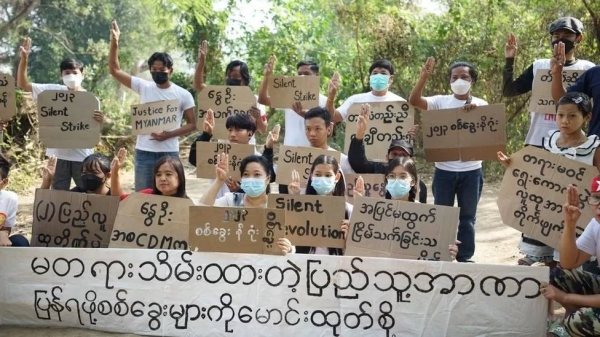
Sudan has been hit by a severe cash shortage as most banks and cash machines remain closed one week after a military coup prompted a nationwide strike by bankers.
About 90% of bankers were taking part in a civil disobedience campaign, said Ibrahim Abdel-Raheem, who works at the Workers National Bank in Sudan’s capital, Khartoum. “We knew that going on strike as bankers would cripple the economy,” he said. “Banks are the backbone of the economy.”
The Sudanese Bankers Association has said it will stage protests in front of banks across the country on Tuesday and Thursday in a “revolutionary escalation” of its campaign.
Abdel-Raheem said the action has affected him personally. “I had to give up many things,” he said. “I don’t even have one pound in my pocket. I am only buying the very basic things, because I have no cash.”
Yassir Binawai, a 46-year-old who works in the mining industry in northern Sudan, said that he had to borrow money from his employer’s canteen to buy food. “It’s been so difficult to manage with the cash shortage,” he said. “But we will not give up despite all the struggles.”
Cash still dominates the Sudanese economy due to a lack of ATM infrastructure. Western Union suspended its operations last week, making access to money harder.
Salah Mamoun, from Omdurman, said he relied on friends who worked in the money exchange industry to get hold of cash. “There’s no money in the market,” he said.
Commodity prices have fluctuated wildly in recent weeks, making financial planning hard for ordinary people.
A shop owner in Khartoum who declined to give his name said he had been forced to borrow money from a neighbour and that his family was struggling. “There’s a recession, nobody buys things from our shop” he said. “My wife has money in her bank account [but] withdrawing it is an issue because the ATMs are empty.”
On 25 October, Sudan’s top general, Abdel Fattah al-Burhan, dissolved the cabinet as well as the ruling joint military-civilian Sovereign Council, which had been heading Sudan’s transition towards full civilian rule after the 2019 overthrow of the autocratic president Omar al-Bashir.
In a move widely condemned internationally, Burhan declared a state of emergency and detained Sudan’s civilian leadership, including the prime minister, Abdalla Hamdok, and members of his government.
The US special envoy for the Horn of Africa, Jeffrey Feltman, arrived in Khartoum on Tuesday to try to defuse the crisis.
Feltman accused Burhan of acting in bad faith by staging the coup hours after holding face-to-face discussions with him in Khartoum, in which he gave no hint of his plan to seize power.
The US has paused $700m in debt relief and aid and urged potential allies of the Sudanese military – Russia and the United Arab Emirates – not to back the coup. “We are in with a number of nations, including the UAE, to restore the civilian [government] in Sudan,” Feltman said.
Feltman urged the military to restore the ousted civilian government, release all prisoners including Hamdok, who is currently under house arrest, as well as to allow medical assistance to reach injured demonstrators without interference.
“To the freedom-loving Sudanese and to those who would seek to rob them of their democratic ambitions, I say: ‘The world is watching and the Sudanese people have made it clear they will not accept a military attempt to sideline their hard fought democratic transition.’”
Feltman also questioned Burhan’s bona fides. “For all his statements supporting the constitutional declaration of 2019 and their desire for elections, his actions have done the opposite, undermined the civilian military partnership and hijacked the type of transition that the military and civilians had agreed,” he said.












